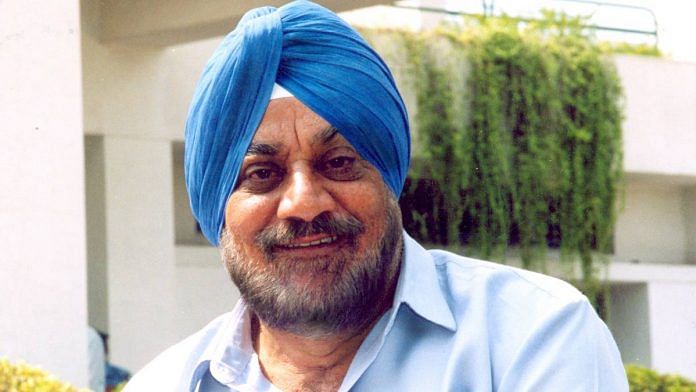New Delhi: “As I look back at life, it is nothing but the power of the mind that matters the most. Scaling Mount Everest and scaling up ISIC (Indian Spinal Injuries Centre) have taught me a powerful truth — life is all about conquering the other summit — the summit of mind.” These words, written by Major H.P.S. Ahluwalia — Everest climber, author and activist — who passed away Friday evening in Delhi, best sum up a life that included many achievements, among them, the setting up of the Indian Spinal Injuries Centre in the national capital in 1993. Ahluwalia was 85, and is survived by his wife and daughter.
The former Army Major is credited with making significant contributions in the fields of adventure, sports, environment, disability and injury treatment and social work. He was a member of the first successful Indian expedition to Mount Everest in 1965, along with fellow army men H.C.S. Rawat and Phu Dorjee. All three were part of the third expedition to the Everest led by the Indian Army.
Unfortunately, soon after he climbed the summit, Ahluwalia suffered a bullet injury in the 1965 war with Pakistan, which left him confined to a wheelchair. He received an early discharge from the Army in 1968, with the honorary rank of a major.
He once recalled the period after his injury in these words: “I was unconscious for 15 days. Sometimes in your dreams you are skiing down a mountain, climbing a mountain, that kind of happy dreams. The moment you get up it was sad, because you saw yourself over a big slab of ice, temperature 105, and then felt it was better to remain unconscious than to go through all this. And so many tubes, so many tubes.”
In a statement that paid tribute to his spirit and his never-say-die attitude, ISIC issued a statement Saturday remembering Ahluwalia as, “Our strength, our inspiration, our hero! The man who conquered Everest, the man who conquered life. The legacy will live on in our hearts and thoughts forever”.
Reaching for the heights
Ahluwalia was born on 6 November, 1936 in Shimla. His father was a civil engineer employed in the Indian Central Public Works Department. After his graduation from St. George’s College, Mussoorie, he joined the Indian Army as an officer in the Corps of EME in 1958.
He had an enduring love for mountaineering and once wrote, “From my childhood I have been attracted by mountains. I had been miserable, lost, when away from mountains, in the plains. Mountains are nature at its best. Their beauty and majesty pose a great challenge, and like many, I believe that mountains are a means of communion with God”.
Ahluwalia received advanced training in mountaineering at the Himalayan Mountaineering Institute, Darjeeling. He climbed extensively in Sikkim, Nepal and later scaled Mount Everest on 29 May, 1965.
Ahluwalia was also an author of 13 books, which include Higher Than Everest, Eternal Himalaya, Ladakh — The Hermit Kingdom, Climbing Everest, Faces of Everest, among others. He was also a producer of the award-winning series, Beyond Himalaya, which has been telecast on Discovery and National Geographic channels.
He was also the chairman of the Special Ability Trust (created to assist young achievers with disabilities with fellowships and scholarships), the Rehabilitation Council of India (a statutory body under the Ministry of Social Justice & Empowerment) and many others.
Ahluwalia had received the Padma Bhushan, Padma Shri, Ajuna Award and Tenzing Norgay National Adventure Award.
“He was also the president of the Indian Mountaineering Foundation and Delhi Mountaineering Association. So many young aspiring mountaineers like me took inspiration from his grit, perseverance and never-say-die spirit,” Everest climber from Haryana, Sunita Singh Choken, told ThePrint.
She added: “He was a role model for many. Imagine climbing the highest mountain and being confined to a wheelchair soon after… but he chose to work for those with disabilities and stayed active throughout his life. That is the true spirit of a mountaineer.”
Also read: Shehroze Kashif in Guinness Records is the pride of Pakistan—youngest to scale Everest, K2



